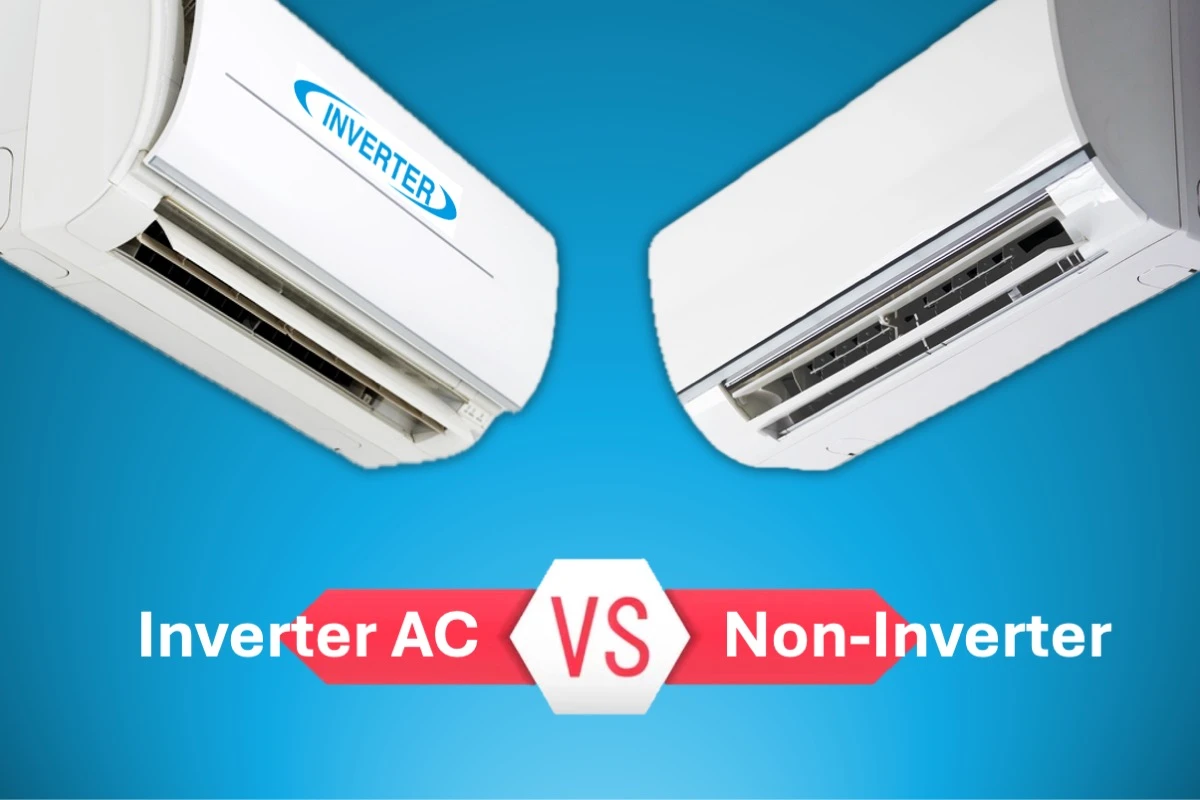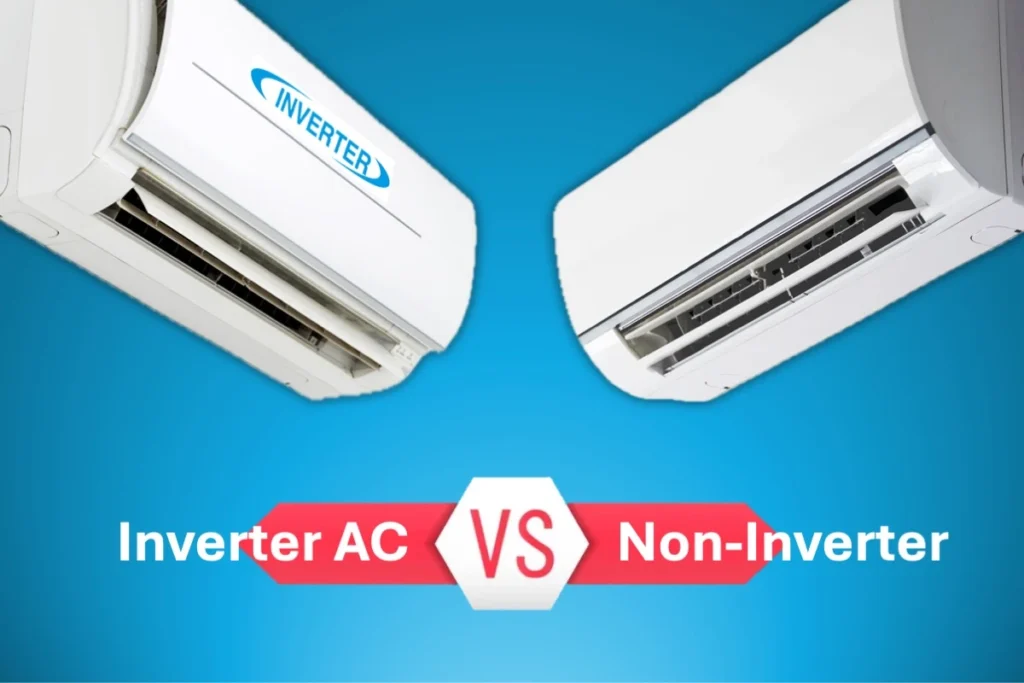Inverter vs Non-Inverter Air Conditioner – Which is Better for Your Home?

Inverter vs Non-Inverter Air Conditioner – Which is Better for Your Home?
When purchasing an air conditioner (AC), one of the most common and important decisions is choosing between an inverter and non-inverter air conditioner. Both types of AC units cool your space effectively, but they use different technologies that impact energy efficiency, performance, cost, and long-term benefits.
If you’re confused about which type of air conditioner is best for your home, this complete guide on inverter vs non-inverter AC will help you make the right decision.

What is an Inverter Air Conditioner?
An inverter air conditioner uses advanced technology with a variable-speed compressor that automatically adjusts the cooling power based on the room temperature. Once the desired temperature is reached, the inverter AC reduces its speed but doesn’t turn off, resulting in consistent cooling and lower energy consumption.
✅ Key Features of Inverter AC:
- Energy-efficient operation
- Quiet performance
- Longer lifespan
- Ideal for regular use
- Advanced cooling control
What is a Non-Inverter Air Conditioner?
A non-inverter air conditioner uses a fixed-speed compressor that works at full capacity. When the room reaches the set temperature, the compressor turns off and restarts when the temperature rises again. This start-stop cycle leads to higher electricity usage and more noise.
✅ Key Features of Non-Inverter AC:
- Lower initial cost
- Simple technology
- High power consumption
- Louder operation
- Best for occasional use
Inverter vs Non-Inverter AC: Quick Comparison Table
| Feature | Inverter AC | Non-Inverter AC |
|---|---|---|
| Compressor Speed | Variable | Fixed |
| Power Efficiency | High | Low |
| Cooling Control | Precise | On/Off Cycles |
| Noise Level | Low | High |
| Energy Consumption | Low | High |
| Initial Price | High | Low |
| Maintenance | Moderate | Easy |
| Best For | Regular use | Occasional use |
1. Energy Efficiency
The most important difference between inverter and non-inverter ACs is their energy consumption. Inverter ACs adjust compressor speed to maintain room temperature with less energy. This makes them 30% to 50% more efficient than non-inverter models.
Non-inverter ACs turn on and off frequently, consuming a high amount of electricity each time they start.
✅ SEO Tip: If you’re searching for the most energy-efficient air conditioner, inverter AC is your best option.
Winner: ✔ Inverter AC
2. Performance and Comfort
Inverter ACs provide consistent and faster cooling without temperature fluctuations. This is ideal for homes, offices, and bedrooms where comfort is important.
Non-inverter ACs may cool quickly, but frequent on-off cycles can lead to uneven temperatures, affecting your comfort.
Winner: ✔ Inverter AC
3. Electricity Bill Savings
An inverter AC may cost more upfront, but it can significantly reduce your monthly electricity bill, especially if used daily or for long hours.
Non-inverter ACs, while cheaper initially, will increase your power bills over time due to inefficient cooling.
✅ SEO Keyword: Reduce electricity bill with inverter AC
Winner: ✔ Inverter AC (for long-term savings)
4. Noise Level
Inverter air conditioners operate at variable speeds, meaning they produce minimal noise, making them ideal for bedrooms, baby rooms, or study areas.
Non-inverter ACs, due to the start-stop nature of the compressor, tend to produce more operational noise.
Winner: ✔ Inverter AC
5. Price Comparison
- Inverter AC Price: Higher due to advanced technology.
- Non-Inverter AC Price: Lower, suitable for budget-conscious buyers.
If your budget is tight and the AC will be used occasionally, a non-inverter AC may still be a good short-term choice.
✅ SEO Tip: Include keywords like inverter AC price in Bangladesh or best budget AC if targeting local searches.
Winner: 🔄 Depends on usage and budget
6. Maintenance and Repair
Inverter ACs have more advanced technology, which can mean slightly higher maintenance costs and a need for trained technicians. However, due to smoother operation, the compressor usually has a longer lifespan.
Non-inverter ACs have simpler mechanics and are easier to repair, but the frequent on-off cycles can wear out the compressor faster.
Winner: 🔄 Tie – depends on long-term usage
7. Environmental Impact
Thanks to lower power consumption, inverter ACs are more eco-friendly and contribute to lower carbon emissions. Most modern models also use R-32 or R-410A refrigerants, which are better for the environment.
Non-inverter ACs consume more electricity and may use older refrigerants, which are harmful to the ozone layer.
✅ SEO Keyword: Eco-friendly ACs for home
Winner: ✔ Inverter AC
8. Ideal Use Case
✅ Choose Inverter AC if:
- You use AC for more than 4–6 hours daily
- You want to save on long-term energy bills
- You prefer silent operation
- You care about eco-friendly appliances
✅ Choose Non-Inverter AC if:
- You use AC occasionally (less than 2–3 hours per day)
- You have a tight budget
- You need cooling in temporary spaces like rented homes or shops
Frequently Asked Questions (FAQs)
❓ Is inverter AC better for home use?
Yes, inverter ACs are better for homes due to their efficient performance, lower noise, and long-term savings.
❓ Does inverter AC save electricity?
Yes. It can save up to 50% electricity compared to a non-inverter AC.
❓ Which lasts longer: inverter or non-inverter AC?
Inverter ACs usually last longer because the compressor isn’t constantly starting and stopping.
❓ What is the difference in electricity bill between inverter and non-inverter AC?
Depending on usage, inverter ACs can cut your electricity bill by 30–50% per month.
Conclusion: Which Air Conditioner is Right for You?
When it comes to inverter vs non-inverter air conditioners, the inverter AC is the smarter choice for most homeowners. Although the initial price is higher, the benefits in energy savings, performance, and comfort far outweigh the cost.
However, for budget-conscious users or for limited use, a non-inverter AC still offers value and effective cooling.
Final Verdict
| Scenario | Best Option |
|---|---|
| Daily Use | ✅ Inverter AC |
| Low Budget | ✅ Non-Inverter AC |
| Long-Term Savings | ✅ Inverter AC |
| Temporary or Rental Use | ✅ Non-Inverter AC |
| Quiet & Eco-Friendly Choice | ✅ Inverter AC |
Want to Buy the Best AC in Bangladesh?
If you’re looking for the best inverter or non-inverter AC in Bangladesh, we recommend checking out trusted brands like:
- Samsung
- Gree
- LG
- General
- Walton
- Mitsubishi
- Daikin
Look for models with high EER ratings, R-32 refrigerants, and good after-sales service.

জনাব বাংলায় লিখে দিলে ভালো হয়